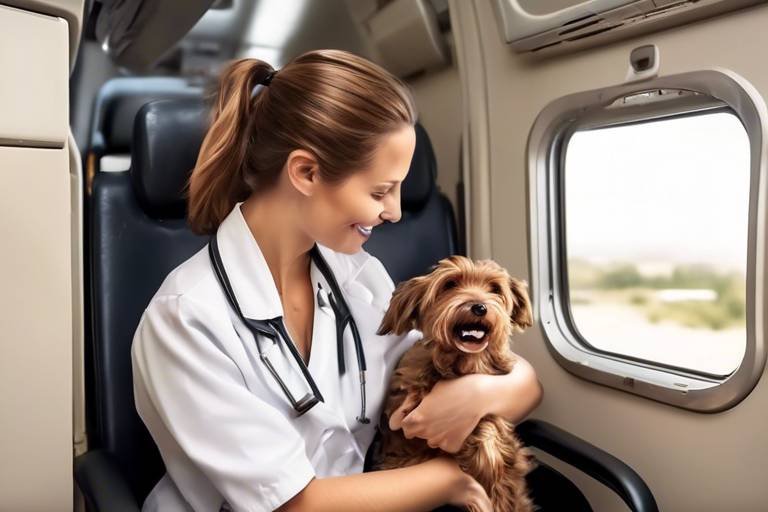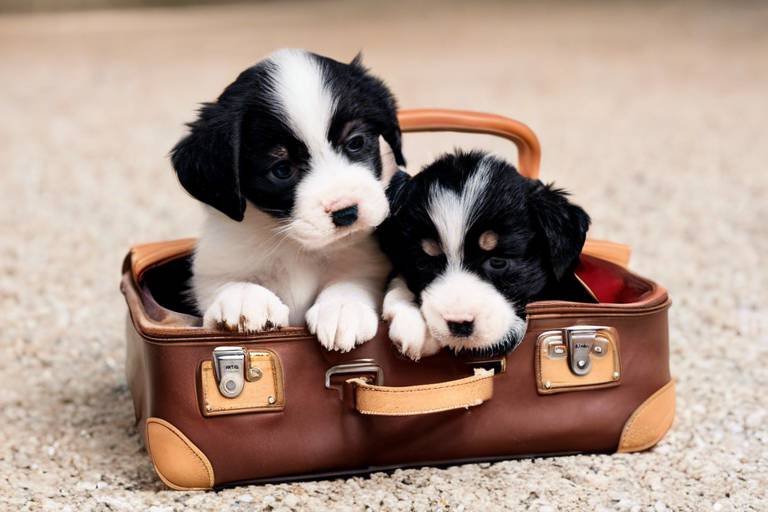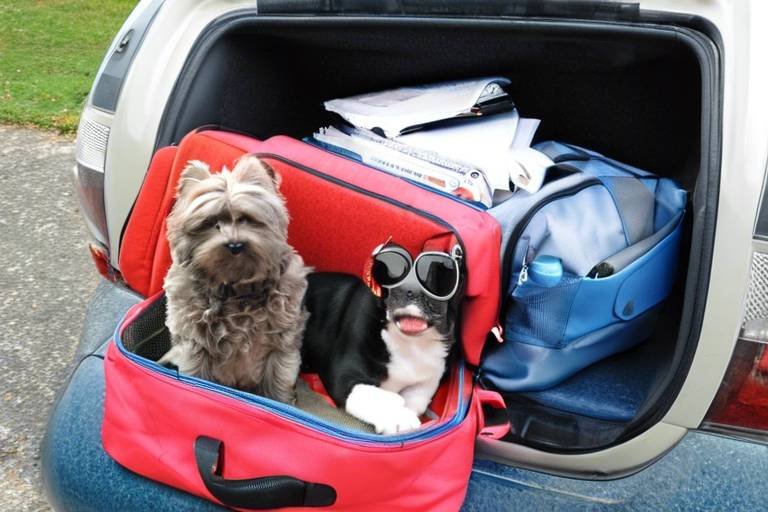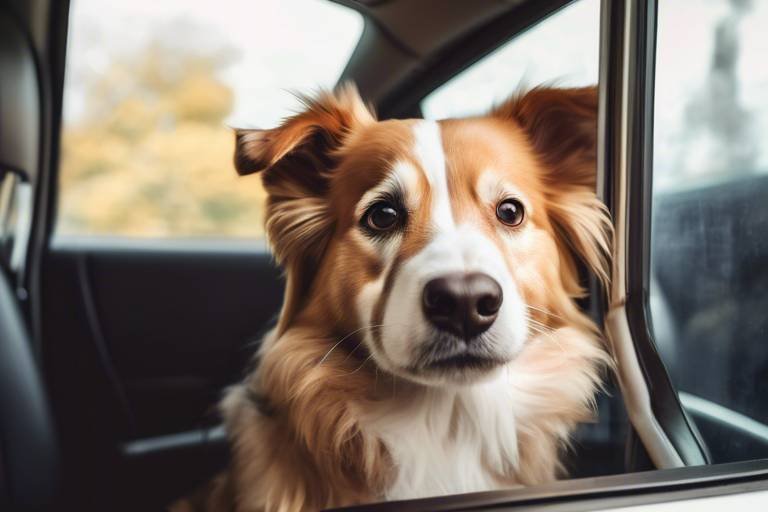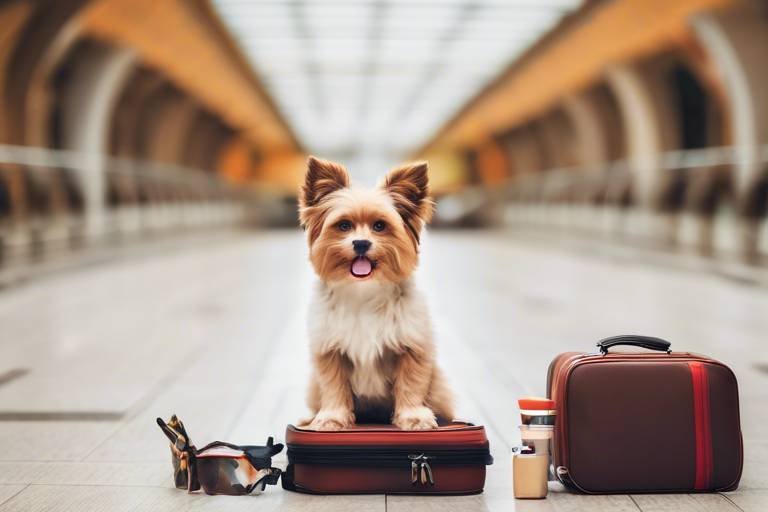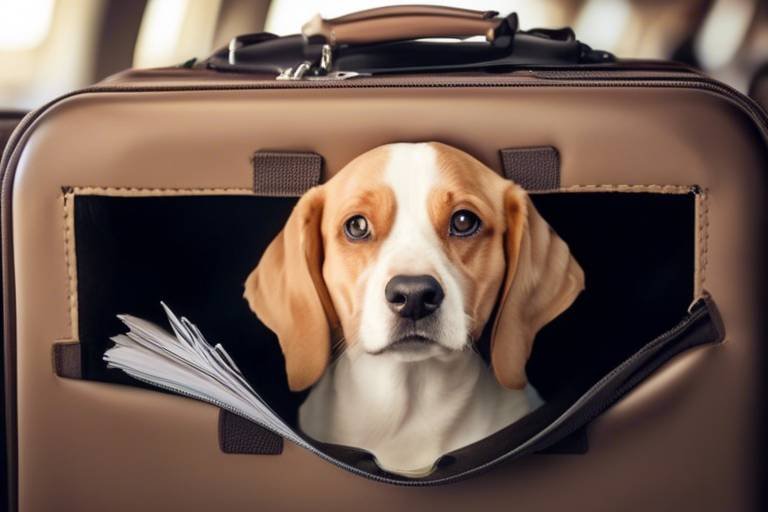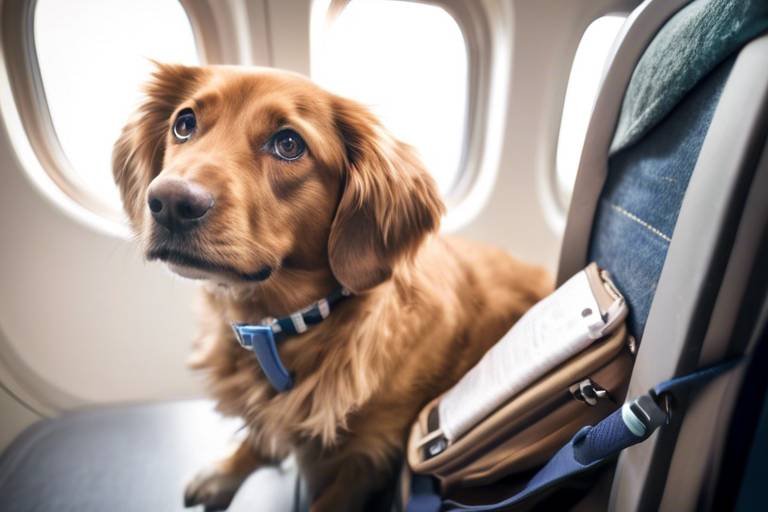How to Handle Veterinary Needs While Traveling
Traveling with your furry friend can be one of the most rewarding experiences, but it also comes with its own set of challenges, especially when it comes to handling their veterinary needs. Whether you're planning a weekend getaway or a cross-country road trip, ensuring your pet's health and safety is paramount. Imagine the joy of exploring new places with your pet by your side, but also picture the anxiety of not knowing where to find veterinary care if something goes wrong. By preparing ahead of time, you can alleviate much of this stress and focus on creating lasting memories with your companion.
First things first, **planning is key**. Before you set off, make sure you have all the necessary documents for your pet, including vaccination records and any medication prescriptions. These documents not only ensure your pet's health but can also be a requirement for certain accommodations or travel methods. Think of it as packing your pet's travel bag—it's not just about their favorite toys but also about their health essentials.
Next, acclimating your pet to travel conditions is crucial. If your pet isn't used to long car rides or being in a new environment, consider taking them on shorter trips to help them adjust. This can reduce anxiety and make the actual travel experience much smoother. Just like us, pets can feel overwhelmed in unfamiliar situations, so introducing them gradually can make a world of difference.
Once your travel plans are set, it's time to focus on where you'll be staying. Choosing **pet-friendly accommodations** is essential for a stress-free trip. Look for places that not only welcome pets but also have a good reputation for taking care of them. Check their pet policies, and don’t hesitate to ask about nearby veterinary services. Knowing where to go in case of an emergency can provide peace of mind. After all, you wouldn’t want to be in a new city with a sick pet and no idea where to take them!
In addition to finding the right place to stay, researching local veterinary clinics at your destination is a must. Create a list of clinics, their hours, and the services they offer. This way, if your pet requires immediate attention, you can respond quickly. It’s like having a safety net—knowing that help is just around the corner can ease your worries.
Identifying emergency veterinary services in the area you’re visiting is another crucial step. Emergencies can happen at any time, and having this information readily available can save you precious minutes. Make sure to note the contact details and address of the nearest emergency clinic. You might even want to program the numbers into your phone for easy access.
Have you ever thought about mobile veterinary services? These are fantastic options that can come directly to your location, which can be especially helpful if your pet experiences anxiety when visiting a clinic. Imagine the convenience of having a vet come to you, allowing your pet to stay in their familiar environment while receiving care.
When it comes to medications, ensure you have an adequate supply of your pet’s prescriptions. It’s wise to pack extra just in case of delays or extended stays. Keeping your pet’s medication routine consistent is vital for their health. Consider creating a **medication schedule** to help you keep track of doses, especially if you’re managing multiple medications.
While you’re away, try to maintain your pet's routine as much as possible. Familiar items, such as their favorite blanket or toys, can provide comfort in new surroundings. Stick to their feeding schedules and exercise routines, as this can help alleviate stress. Think of it as keeping a piece of home with you, making the transition smoother for your furry friend.
Implementing safety measures during travel is vital. Make sure to secure your pet in a carrier or harness while in the car, and ensure proper ventilation. Never leave them unattended in a vehicle, as temperatures can rise quickly and pose serious risks. Just like you buckle up for safety, your pet deserves the same level of protection!
Finally, travel can sometimes trigger behavioral problems in pets. Understanding common issues, such as anxiety or restlessness, can help you manage them effectively. Bring along calming aids or familiar items that can help soothe your pet. Remember, a little preparation goes a long way in ensuring a pleasant experience for both you and your furry companion.
- What should I do if my pet gets sick while traveling? - Always have a list of local vets handy and contact them immediately.
- Can I travel with my pet's medications? - Yes, ensure you have enough supply and keep them in their original packaging.
- How can I reduce my pet's travel anxiety? - Bring familiar items and maintain their routine as much as possible.
- Are mobile veterinary services available everywhere? - Availability varies by location, so research ahead of time.

Preparing for Travel
Understanding how to prepare your pet for travel is crucial. Imagine embarking on a journey without ensuring your furry friend is ready; it could lead to a chaotic experience for both of you! Before you set off, it’s essential to secure all necessary documents, including vaccination records and health certificates. These documents not only ensure compliance with travel regulations but also provide peace of mind in case of emergencies.
Next, acclimating your pet to travel conditions can significantly ease their anxiety. Start with short car rides to help them get used to being in a vehicle. Gradually increase the duration of these trips to mimic the actual travel experience. This way, your pet won't feel overwhelmed when the time comes to hit the road for real. Additionally, ensure that your pet is healthy enough for the journey. A visit to the veterinarian prior to your trip can help identify any potential health issues that could arise while traveling.
It’s also wise to pack a travel kit for your pet. This kit can include essentials such as:
- Food and water bowls
- Leash and collar
- Familiar toys or blankets
- Medications and health records
- Waste bags for clean-up
By having these items on hand, you can create a sense of familiarity for your pet, which can help reduce stress. And let’s not forget about safety! Make sure your pet is secured in a carrier or harness during travel. This is not only for their safety but also for your own peace of mind. After all, a distracted driver is a dangerous driver!
Lastly, consider the environment you’ll be traveling to. Research the climate and terrain of your destination. Is it hot and humid? Or perhaps cold and snowy? Understanding these factors can help you prepare accordingly. For instance, if you’re heading to a warmer climate, ensure your pet stays hydrated and has access to shade. Conversely, if it’s colder, consider a cozy sweater or jacket for your furry friend.
In summary, proper preparation is the key to a smooth travel experience with your pet. By securing necessary documents, acclimating them to travel conditions, packing a travel kit, and considering the destination’s environment, you can ensure that both you and your pet have a delightful adventure together.

Choosing Pet-Friendly Accommodations
When it comes to traveling with your furry friend, choosing the right accommodations can make all the difference between a fun-filled adventure and a stressful ordeal. Imagine this: you’ve finally escaped the daily grind, and you’re ready for a relaxing getaway, but your pet is feeling anxious because the place you booked isn't welcoming to animals. To avoid such scenarios, it’s essential to thoroughly research and select pet-friendly accommodations that cater to both you and your pet's needs.
First and foremost, look for hotels, motels, or vacation rentals that explicitly state they are pet-friendly. Many establishments have specific pet policies, including weight limits, breed restrictions, or additional fees. Make sure to read the fine print carefully. You wouldn’t want to show up at a place only to find out that your beloved Golden Retriever is not allowed. It’s like planning a picnic and forgetting the blanket—definitely not ideal!
Another crucial factor is the proximity to veterinary services. Accidents happen, and sometimes pets can get into mischief while exploring new surroundings. Knowing where the nearest veterinary clinic is located can provide peace of mind. You can create a small table with essential information to keep handy:
| Location | Contact Number | Hours of Operation |
|---|---|---|
| Happy Paws Veterinary Clinic | (123) 456-7890 | Mon-Fri: 9 AM - 6 PM |
| Pet Care Animal Hospital | (987) 654-3210 | 24/7 Emergency Services |
Additionally, consider the overall comfort of your pet in the chosen environment. Some pets may feel anxious in unfamiliar spaces, so look for accommodations that provide a cozy atmosphere. Features such as spacious rooms, easy access to outdoor areas, and even pet-friendly amenities like dog parks or designated pet areas can significantly enhance your pet's experience. After all, a happy pet means a happy traveler!
Don’t forget to check online reviews and testimonials from other pet owners. These can provide invaluable insights into how accommodating a place truly is. Look for comments that mention the staff's attitude towards pets, cleanliness, and any special services offered. It’s like getting a sneak peek into someone else’s experience—very handy!
Lastly, if you’re considering vacation rentals through platforms like Airbnb or VRBO, make sure to communicate directly with the host about their pet policy. Some hosts may have specific rules or might even have additional pet amenities to offer. It’s always better to ask first than to assume and risk a last-minute change in plans!
In summary, choosing the right pet-friendly accommodation is about ensuring a comfortable and safe environment for your furry companion. By considering pet policies, nearby veterinary services, and the overall atmosphere, you can ensure that your travel experience is enjoyable for both you and your pet. Remember, a little planning goes a long way in making your trip a memorable one!
Researching Veterinary Clinics
When embarking on a journey with your beloved pet, one of the most important steps is in your destination area. This may not be the most exciting part of your travel preparations, but it's certainly one of the most crucial. Imagine being in an unfamiliar place and your furry friend suddenly falls ill or gets injured. Wouldn’t you want to know exactly where to go for help? By doing your homework ahead of time, you can ensure that you have peace of mind throughout your trip.
Start by using online resources to locate veterinary clinics near your travel destination. Websites like Yelp or Google Maps can provide a list of local veterinarians, complete with reviews from pet owners who have used their services. Pay attention to the ratings and feedback, as they can give you valuable insights into the quality of care provided by each clinic. Additionally, check if the clinics have specific services that cater to your pet's needs, such as emergency care or specialists.
Once you have a list of potential clinics, take a moment to note their operating hours and contact information. Some clinics might have irregular hours, especially during weekends or holidays, which could be a significant factor if you need immediate assistance. Having this information readily available can save you from unnecessary stress when time is of the essence. You can create a simple table to keep track of these details:
| Clinic Name | Address | Phone Number | Hours of Operation |
|---|---|---|---|
| Happy Paws Veterinary Clinic | 123 Furry Lane, Petville | (555) 123-4567 | Mon-Fri: 9 AM - 6 PM |
| Pet Care Hospital | 456 Woof Street, Animal Town | (555) 987-6543 | 24/7 Emergency Services |
Another essential factor to consider is the clinic's proximity to your accommodation. You wouldn't want to be stuck in traffic when your pet needs urgent care. Therefore, aim to choose a clinic that’s conveniently located. It’s also wise to call ahead to ask about their policies on new patients, especially if you’re traveling with a pet that has specific health needs or requires ongoing medication.
In addition to traditional veterinary clinics, don't overlook the value of mobile veterinary services. These services can come to you, which is a fantastic option for pets that experience anxiety in unfamiliar environments. Knowing that you have access to a vet who can provide care right at your location can be a game-changer, especially during travel.
Finally, remember to keep a list of any medical records or vaccination documents handy. Some clinics may require proof of vaccinations before providing services, so having these documents easily accessible can save you time and hassle. A little preparation goes a long way in ensuring that your pet is safe and well taken care of, allowing you to focus on enjoying your travels together.
- What should I do if my pet gets sick while traveling? Always have a list of local veterinary clinics handy. Contact the nearest one immediately for guidance.
- How can I find a good vet in a new area? Research online reviews, ask locals, and check for clinics with emergency services.
- Should I bring my pet's medical records when traveling? Yes, always have a copy of your pet's medical records and vaccination history for emergencies.
- Are mobile vets available everywhere? Mobile veterinary services are becoming more common, but availability varies by location.
Emergency Veterinary Services
When you're on the road with your beloved pet, the last thing you want to think about is an emergency. However, being prepared for unexpected situations is crucial for any pet owner. Imagine this: you're enjoying a beautiful day at the park when your furry friend suddenly becomes unwell. Panic sets in, and you find yourself scrambling to find a veterinary clinic. This is why knowing the locations of in advance can be a lifesaver.
Before your trip, dedicate some time to researching the veterinary clinics in your destination area. Make a list of local emergency vets, their contact information, and their operating hours. You might even consider creating a simple table to keep track of this important information, like so:
| Clinic Name | Address | Phone Number | Hours of Operation |
|---|---|---|---|
| Happy Paws Emergency Vet | 123 Pet Lane, Dogtown | (123) 456-7890 | 24/7 |
| Furry Friends Animal Hospital | 456 Cat Street, Meow City | (987) 654-3210 | 8 AM - 8 PM |
Additionally, don't forget to check if there are any mobile veterinary services available in the area. These services can come directly to you, which is especially beneficial if your pet suffers from anxiety or stress when visiting a clinic. Imagine the relief of having a vet come to your location instead of having to load your anxious pet into the car and drive to an unfamiliar place!
In case of an emergency, time is of the essence. Having this information readily available can save precious minutes that might make all the difference in your pet's care. It’s also wise to familiarize yourself with the types of services offered by these clinics. For instance, some may specialize in urgent care, while others might provide comprehensive emergency services, including surgeries and overnight stays.
Lastly, keep in mind that not all emergencies are created equal. Some situations may require immediate attention, while others can wait a bit longer. Understanding the difference can help you make informed decisions. For example, if your pet has a minor injury but is stable, you might choose to visit a regular clinic during business hours rather than an emergency vet. On the other hand, if your pet is experiencing severe symptoms such as difficulty breathing or excessive bleeding, you should seek emergency care without delay.
By taking these proactive steps, you can ensure that you and your pet are prepared for any situation that may arise while traveling. Remember, a little preparation goes a long way in keeping your furry friend safe and healthy on your adventures!
- What should I do if my pet has an emergency while traveling?
Immediately locate the nearest emergency veterinary service using your pre-researched list. Call ahead if possible to inform them of your situation.
- How can I find a good emergency vet?
Look for online reviews, ask for recommendations from local pet owners, or check with your regular vet for suggestions.
- Are emergency veterinary services more expensive?
Yes, emergency services often come at a premium due to the immediate care and specialized equipment available. Be prepared for higher costs.
Mobile Veterinary Services
When you're on the road with your furry friend, the last thing you want is to be caught off guard by a sudden health issue. That's where come into play. Imagine having a veterinarian come right to your location, whether it's a hotel, campsite, or even a friend's house. This convenience can be a game-changer, especially for pets that experience anxiety during traditional vet visits. Mobile vets provide a range of services, from routine check-ups to emergency care, all without the stress of transporting your pet.
One of the biggest advantages of mobile veterinary services is the personalized attention your pet receives. In a familiar environment, your pet is likely to feel more at ease, allowing the vet to conduct thorough examinations without the usual stressors. This can lead to more accurate assessments and a better overall experience for both you and your furry companion.
Before you hit the road, it’s wise to research mobile veterinary options in your destination area. Here are a few things to consider when evaluating these services:
- Availability: Check if the service operates during your travel dates and hours.
- Services Offered: Ensure they provide the specific care your pet may need, from vaccinations to emergency treatments.
- Reviews and Recommendations: Look for testimonials or ask fellow travelers for recommendations to find a reliable mobile vet.
To make your search easier, you might want to keep a list of mobile veterinary services handy. Here’s a simple table format that can help you organize your findings:
| Service Name | Location | Contact Number | Services Offered |
|---|---|---|---|
| Vet on Wheels | City Center | (123) 456-7890 | General check-ups, vaccinations, emergency care |
| Pawsitive Care Mobile Vet | Downtown | (987) 654-3210 | Routine exams, dental care, urgent care |
In addition to the convenience, mobile veterinary services can also be beneficial for pets with chronic conditions that require regular monitoring. Instead of stressing them out with frequent trips to the clinic, a mobile vet can provide the necessary care right where your pet feels the most comfortable. This not only helps maintain their health but also enhances their quality of life while traveling.
In conclusion, mobile veterinary services can be a lifesaver for pet owners on the go. By planning ahead and knowing your options, you can ensure your pet receives the care they need without the added stress of traditional vet visits. So next time you're planning a trip, consider the benefits of having a mobile vet on your speed dial!
Q: What types of services do mobile veterinarians offer?
A: Mobile veterinarians typically offer a range of services including wellness exams, vaccinations, diagnostics, and emergency care. Some may also provide specialized services like dental care or behavioral consultations.
Q: How do I find a mobile veterinarian near my travel destination?
A: You can search online for mobile veterinary services in your destination area, check local listings, or ask for recommendations from local pet owners or your regular veterinarian.
Q: Are mobile veterinary services more expensive than traditional clinics?
A: Pricing can vary based on location and services offered. While some mobile vets may charge a travel fee, the convenience and personalized care they provide can often justify the cost.
Q: Can mobile veterinarians handle emergencies?
A: Yes, many mobile veterinarians are equipped to handle emergencies. However, it's essential to confirm this with the service beforehand, as capabilities can vary.
Traveling with Pet Medications
When it comes to traveling with your furry friend, one of the most crucial aspects to consider is their medication. Just like humans, pets may require specific medications to manage their health, and being on the go can disrupt their regular treatment routines. Therefore, it’s essential to plan ahead and ensure you have everything you need to keep your pet healthy and happy during your travels.
First and foremost, consult your veterinarian before embarking on your journey. They can provide you with a detailed list of the medications your pet requires and any additional recommendations for traveling. It's also wise to ask for a copy of your pet's medical records, including vaccination history and prescriptions. This can be particularly useful if you need to visit a vet during your trip.
Next, make sure to pack an adequate supply of your pet’s medications. It’s always better to have a little extra than to run out unexpectedly. When packing, consider the following:
- Storage: Keep medications in their original containers, clearly labeled with your pet’s name, dosage, and instructions.
- Climate: Be mindful of temperature-sensitive medications. If your pet's meds need to be kept cool, pack them with ice packs in a cooler.
- Accessibility: Store your pet's medications in an easily accessible location in your travel bag, so you can quickly retrieve them when needed.
It’s also beneficial to have a list of local veterinary clinics at your destination, as well as their contact information. In the event that your pet experiences any side effects from their medications or if you need a refill, having this information handy can save you valuable time. Additionally, some veterinarians may even provide emergency prescriptions over the phone if needed.
Lastly, if your pet is on any special diets or requires specific care alongside their medications, ensure you have enough of their food and any necessary supplies. Familiarity can make a world of difference for pets, so bringing along their favorite food can help maintain their routine and comfort while traveling.
In summary, traveling with pet medications requires careful planning and consideration. By taking the time to prepare, you can ensure your pet remains healthy and enjoys the journey just as much as you do!
Q: What should I do if my pet runs out of medication while traveling?
A: If you find yourself in this situation, contact a local veterinarian as soon as possible. They may be able to provide a refill or an equivalent medication.
Q: Can I bring my pet's medication in my carry-on luggage?
A: Yes, it is advisable to keep your pet's medication in your carry-on luggage to ensure easy access and to avoid temperature fluctuations in checked baggage.
Q: What if my pet has a reaction to their medication while traveling?
A: If your pet shows any signs of a reaction, such as vomiting, diarrhea, or unusual behavior, seek veterinary assistance immediately. Having a list of local veterinary services can be invaluable in these situations.

Maintaining Routine and Comfort
When traveling with your beloved pet, one of the most important aspects to consider is maintaining their routine and comfort. Just like us, pets thrive on consistency and familiarity. Imagine being whisked away to a new place without any warning—it's disorienting! To help your furry friend feel more at ease, try to keep their daily schedule as normal as possible. This includes feeding times, exercise routines, and even playtime. By sticking to a familiar routine, you can significantly reduce your pet's anxiety during the trip.
To make your pet feel more at home, bring along some of their favorite items. This could be their cozy blanket, a few toys, or even their bed. These familiar smells and textures can provide a sense of security in an unfamiliar environment. Think of it as packing a little piece of home for your pet. Additionally, if your pet has a special diet or feeding schedule, make sure to pack enough food and treats to last the entire trip, plus a little extra just in case of delays.
It's also crucial to incorporate regular exercise into your travel plans. Pets, especially dogs, need their daily dose of activity to stay happy and healthy. Plan for breaks during your journey where your pet can stretch their legs, relieve themselves, and explore new surroundings. Whether it's a quick walk around a rest area or a romp in a pet-friendly park, these moments can make a world of difference in your pet's mood.
While on the road, keep an eye on how your pet is adjusting. Some pets may exhibit signs of stress, such as excessive barking, whining, or restlessness. If you notice these behaviors, try to engage them with their favorite toy or a comforting word. Remember, your calm demeanor can help reassure them that everything is okay. If your pet is particularly anxious, consider using calming products such as pheromone sprays or anxiety wraps, which can help ease their nerves.
Lastly, don’t forget to schedule some downtime for both you and your pet. Traveling can be exhausting, and your furry friend deserves a chance to relax and recharge. Create a cozy spot in your accommodation where they can unwind. This could be a quiet corner with their blanket or a designated area where they feel safe. By ensuring your pet has a comfortable place to retreat to, you’ll help them feel more secure and less overwhelmed by the new environment.
- How can I help my pet adjust to new environments? Bring familiar items, maintain their routine, and provide plenty of opportunities for exercise and exploration.
- What should I do if my pet shows signs of anxiety while traveling? Engage them with toys, offer comfort, and consider using calming products designed for pets.
- Is it necessary to maintain the same feeding schedule while traveling? Yes, maintaining a consistent feeding schedule helps reduce anxiety and keeps your pet's digestive system on track.
Travel Safety Tips
When it comes to traveling with your furry friend, ensuring their safety is paramount. Just like you wouldn’t embark on a road trip without buckling up, your pet deserves the same level of protection. First things first, secure your pet in a carrier or a harness. This not only keeps them safe during sudden stops but also prevents them from roaming around the vehicle, which can be a major distraction. Imagine driving with a toddler unbuckled; it’s the same concept! A well-ventilated, comfortable carrier can make all the difference, providing your pet with a cozy space to relax while you focus on the road.
Another vital aspect of pet travel safety is to never leave your pet unattended in a vehicle. Even on a mildly warm day, the temperature inside a car can rise dramatically, leading to heatstroke or worse. If you must stop, consider taking your pet with you or find a pet-friendly establishment where they can stay safely. It’s like having a lifeguard on duty at the beach—you wouldn’t just leave your child alone in the water, right?
Moreover, having a pet first aid kit handy can be a lifesaver. This kit should include essentials like bandages, antiseptic wipes, and any medications your pet might need. You never know when a minor scrape or allergy flare-up might occur, so being prepared is key. To help you get started, here’s a simple table of items you might consider including in your pet first aid kit:
| Item | Purpose |
|---|---|
| Adhesive Bandages | To cover minor cuts and scrapes |
| Antiseptic Wipes | To clean wounds and prevent infection |
| Gauze Pads | For larger wounds |
| Pet Thermometer | To check for fever |
| Medications | Any prescribed medications your pet may need |
As you embark on your journey, take a moment to familiarize yourself with the local pet laws and regulations of your destination. Some places have specific leash laws or restrictions on where pets can roam freely. It’s always better to be informed than to face unexpected fines or confrontations. Think of it as learning the rules of a new game before you play; it makes the experience smoother and more enjoyable!
Lastly, don’t forget to keep your pet’s identification up to date. A microchip is a great option, but also consider a collar with an ID tag that includes your contact information. In case your pet gets lost, this simple step can make a world of difference. It’s like having a safety net; you want to ensure that if anything goes wrong, there’s a way for you to be reunited with your beloved companion.
- What should I do if my pet gets car sick? - Gradually acclimate them to car rides, and consult your vet for possible medications.
- Can I take my pet to restaurants while traveling? - It depends on the place; always check their pet policy beforehand.
- What if my pet has a medical emergency while traveling? - Research nearby veterinary clinics and emergency services before your trip.
Handling Behavioral Issues
Traveling with pets can be a delightful experience, but it can also bring about a range of behavioral issues that can complicate your journey. Just like humans, pets can feel stressed or anxious when faced with new environments, sounds, and smells. Imagine how you would feel if you were suddenly whisked away to a foreign land without any familiar comforts! This is often how our furry companions feel when they travel. To ensure a smooth trip, it’s essential to recognize potential behavioral challenges and have strategies in place to manage them effectively.
One common issue that pet owners face is anxiety. Whether it's due to the chaos of travel or the unfamiliarity of a new place, pets can become restless, bark excessively, or even refuse to eat. To combat this, try to maintain a sense of routine. Bring along their favorite toys, blankets, or even a piece of your clothing to provide comfort. Familiar scents can work wonders in reducing anxiety. Additionally, sticking to their usual feeding and walking schedules can help them feel more at ease.
Another behavioral challenge is aggression or fearfulness, which can be triggered by new situations or interactions with other pets or people. If your pet tends to be reactive, consider using a muzzle during travel to prevent any incidents. Training your pet to respond to basic commands like "sit" or "stay" can also help manage their behavior in unfamiliar settings. Positive reinforcement, such as treats or praise, can encourage calm behavior and build their confidence.
If your pet is prone to motion sickness, this can lead to a whole host of behavioral issues, including whining or restlessness. Consult your veterinarian about medications or natural remedies that can help ease their discomfort. Traveling with an anxious pet can feel like navigating a minefield, but with the right preparation, you can create a more enjoyable experience for both of you.
In some cases, it might be beneficial to consider professional help before your trip. A certified animal behaviorist can provide tailored strategies to address your pet’s specific behavioral challenges. This proactive approach can make a significant difference, especially if you plan to travel frequently.
Lastly, always keep an eye on your pet's body language. Signs of stress, such as panting, pacing, or excessive yawning, should not be ignored. If you notice these signs, take a moment to pause, reassure your pet, and create a calm environment. Remember, your pet looks to you for guidance and comfort during these times. By staying calm and collected, you can help alleviate their fears and ensure a smoother journey.
Q: What should I do if my pet becomes anxious during travel?
A: If your pet shows signs of anxiety, try to provide familiar items like toys or blankets. Maintain their routine as much as possible and consider consulting your veterinarian for anxiety-reducing medications.
Q: How can I prevent my pet from becoming aggressive during travel?
A: Training your pet in basic commands and using a muzzle if necessary can help manage aggressive behavior. Always supervise interactions with other pets and people.
Q: What are the signs of motion sickness in pets?
A: Common signs include drooling, whining, restlessness, or vomiting. If you suspect your pet has motion sickness, consult your veterinarian for advice on prevention and treatment options.
Frequently Asked Questions
- What should I do to prepare my pet for travel?
Preparing your pet for travel involves several key steps. First, ensure that you have all necessary documents, like vaccination records and health certificates. Acclimating your pet to travel conditions is also crucial—take them on short car rides to help them get used to the motion. Lastly, make sure your pet is healthy enough for the journey by scheduling a vet check-up before you leave.
- How do I find pet-friendly accommodations?
When searching for pet-friendly accommodations, start by checking online travel sites that filter for pet policies. Read reviews to ensure that other pet owners have had positive experiences. Additionally, consider the proximity to local veterinary services, as well as the overall comfort of the environment for your pet.
- Why is it important to research veterinary clinics before traveling?
Researching local veterinary clinics before your trip can be a lifesaver. Knowing the locations, hours of operation, and services they offer can help you respond quickly in case of an emergency. It’s like having a safety net; you’re prepared for anything that might come up during your travels.
- What should I do in case of a veterinary emergency while traveling?
In case of a veterinary emergency, having a list of nearby emergency veterinary services is essential. Make sure to save their contact information and addresses on your phone or in a travel document. This way, you can act swiftly and ensure your pet receives the care they need without wasting precious time.
- Are mobile veterinary services a good option while traveling?
Absolutely! Mobile veterinary services can be incredibly convenient, especially if your pet experiences anxiety in traditional clinic settings. They can come directly to your location, providing the care your pet needs in a familiar environment, which can help reduce stress for both you and your furry friend.
- How can I ensure my pet has enough medication during travel?
To ensure your pet has enough medication during your travels, start by consulting your veterinarian. Ask for a sufficient supply for the duration of your trip, and bring any necessary prescriptions just in case you need refills. Organizing their medication in a travel-friendly container can also help keep things neat and accessible.
- What are some tips for maintaining my pet's routine while traveling?
Maintaining your pet's routine is key to reducing anxiety during travel. Bring familiar items like their favorite blanket or toys to create a sense of home. Try to stick to their regular feeding and exercise schedules as closely as possible to help them adjust to the new environment.
- How can I ensure my pet's safety during travel?
Implementing safety measures during travel is vital. Always secure your pet in a carrier or with a harness, and ensure proper ventilation in your vehicle. Never leave your pet unattended, especially in hot weather, as it can lead to serious health risks. Think of it as buckling up; just like you wouldn’t drive without a seatbelt, your pet needs to be secured for their safety.
- What should I do if my pet exhibits behavioral issues while traveling?
If your pet shows signs of behavioral issues while traveling, such as anxiety or aggression, it’s important to stay calm. Identify the triggers and try to remove them if possible. Bringing along familiar items and maintaining a routine can help. If issues persist, consult with a veterinarian for advice on managing your pet's behavior during travels.

